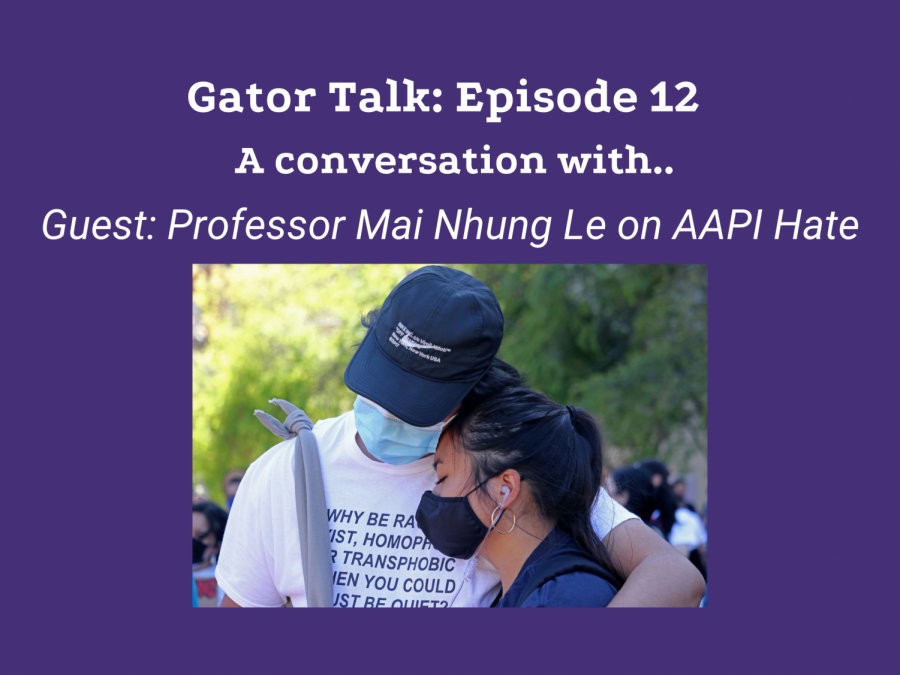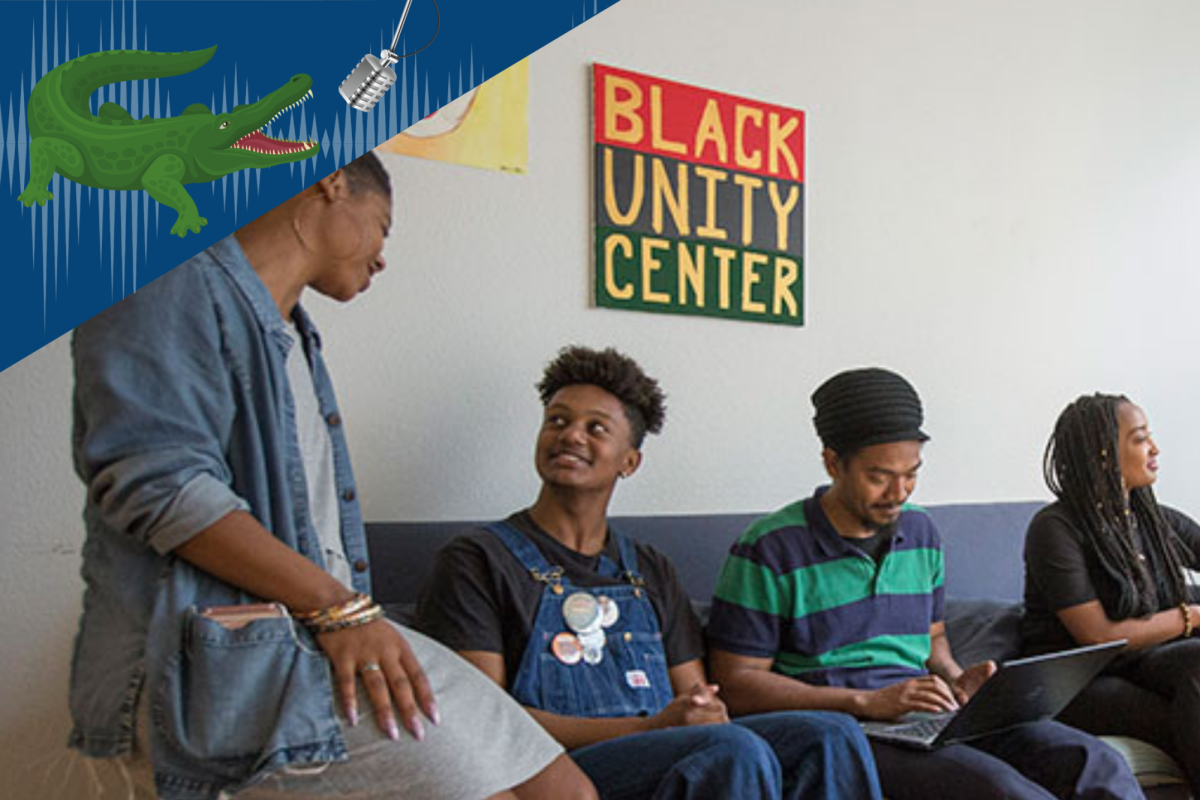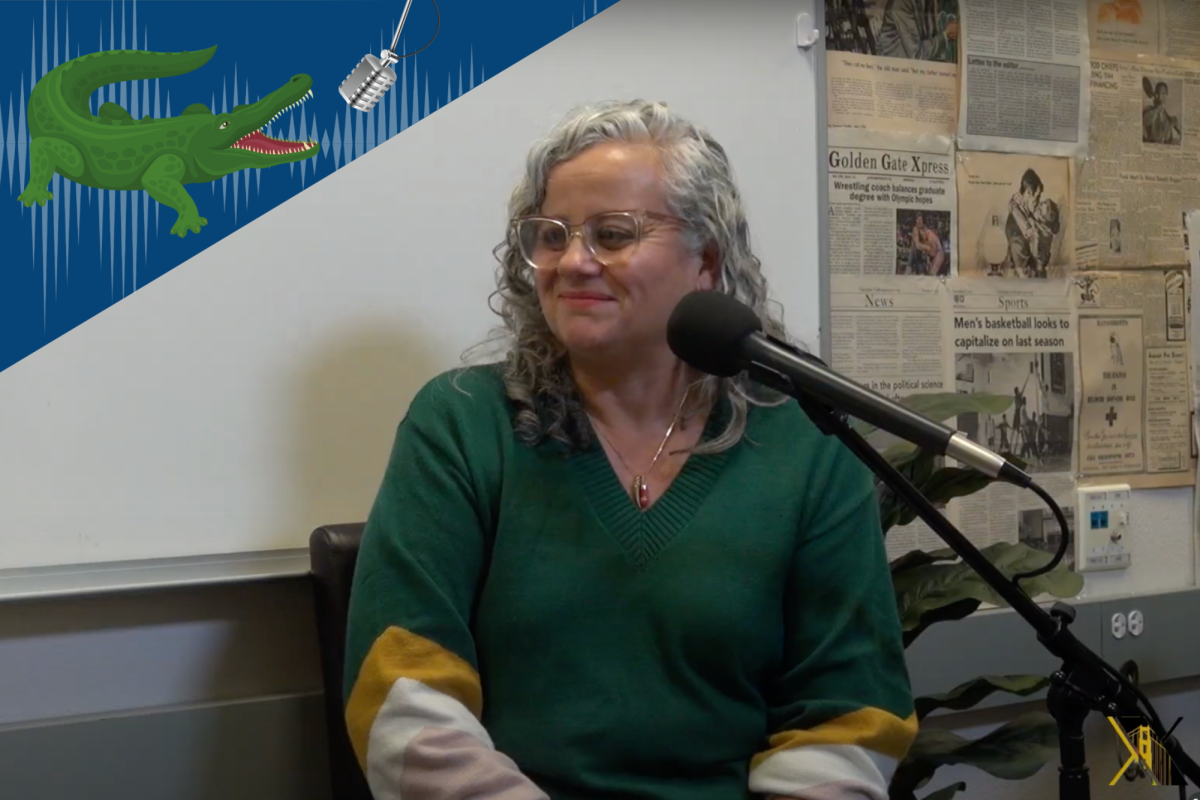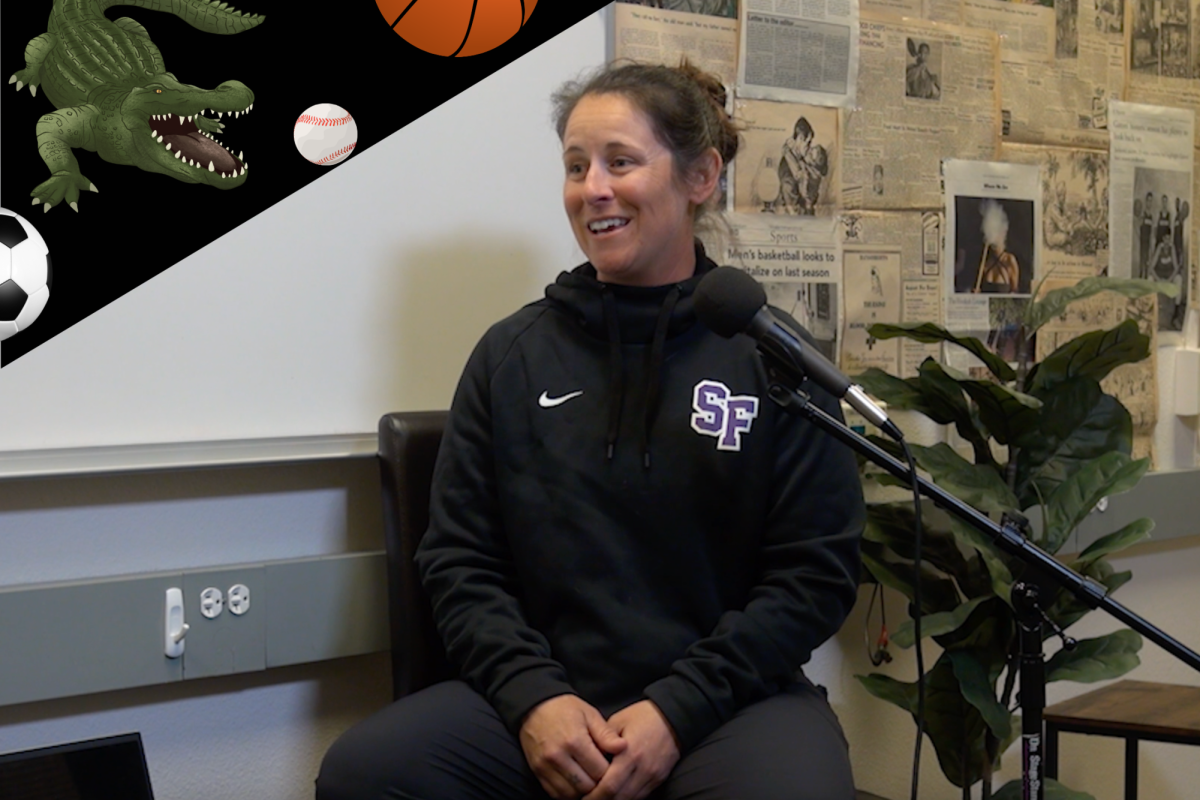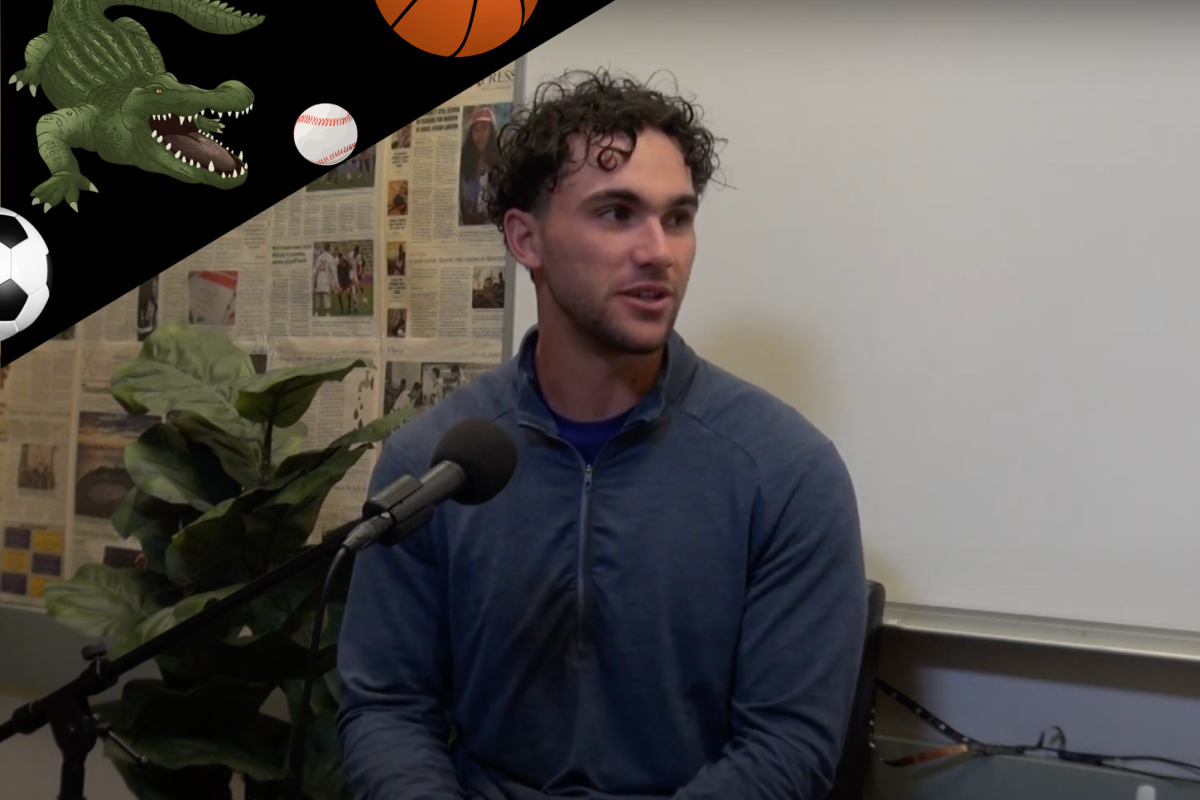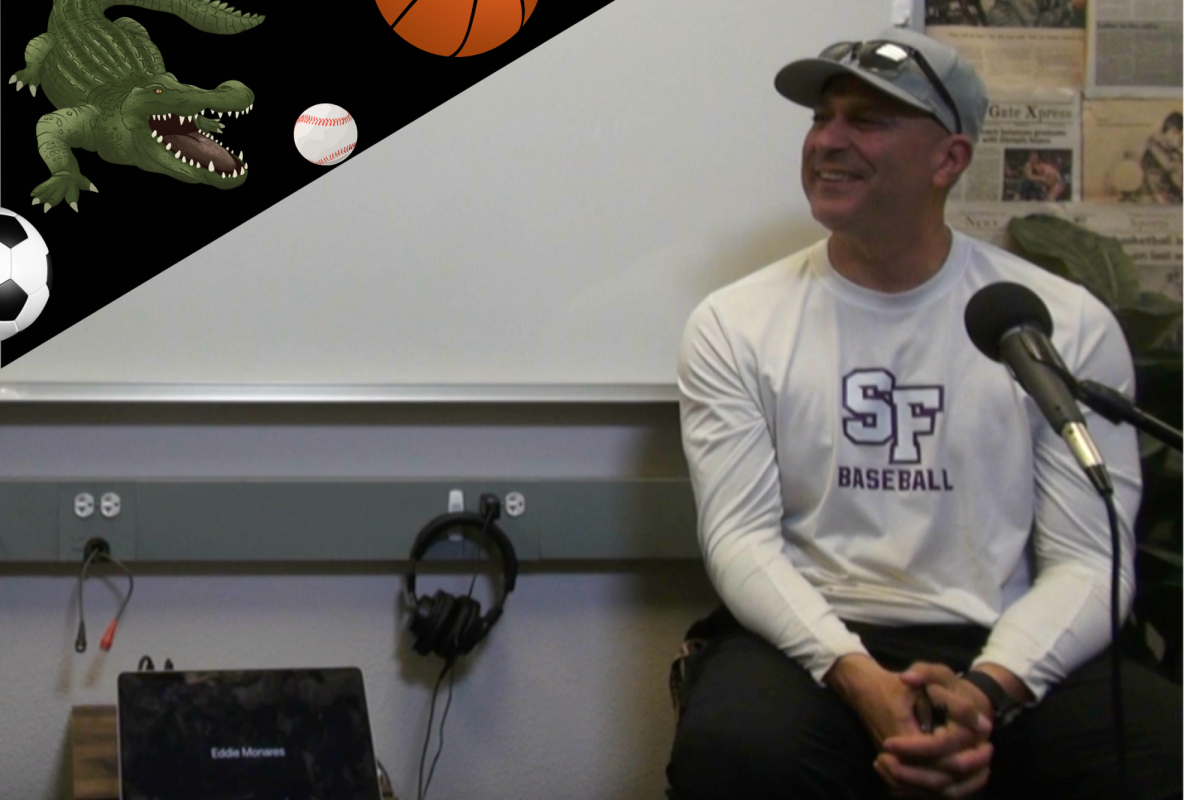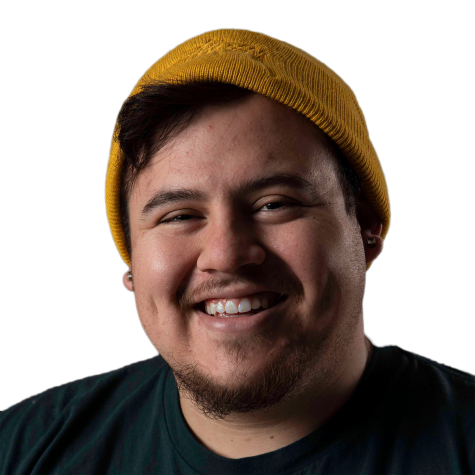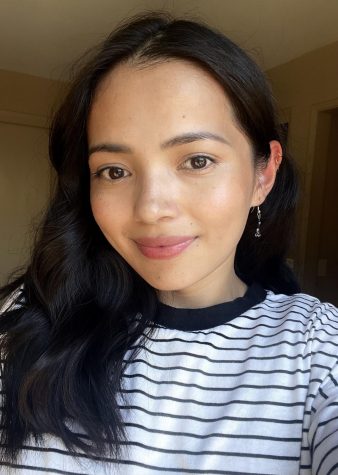Welcome to Gator Talk, a collaborative CalState podcast that brings city and statewide perspectives to SF State news.
In Gator Talk’s twelfth episode, Golden Gate Xpress copy editor Sabita Shrestha takes over the host spot for the episode. Sabita wanted to deeper into anti-Asian hate and racism, so she reached out to Professor Mai Nhung Le, who is the current chair of Asian American Studies Department at SF State.
TRANSCRIPT:
Intro
*Salsa song fades in*
Seb: This is Sebastian Mino-Bucheli, I’m your multimedia editor and your host for Gator Talk, a Golden Gate Xpress podcast that brings news to SF State students.
This is one of the triple-header episodes headed this week while you Gators rest up.
For more information/coverage, check out goldengatexpress.org OR @GatorTalkPod on all social media platforms.
Preview of the show
Seb: Here’s a quick preview of the show.
I’ll be updating the audience with a quick news brief with news that happened this week that matters to SF State students.
Golden Gate Xpress copy editor Sabita Shrestha is the Guest Host for this episode.
News brief
Seb: A lot of news happened this week in the San Francisco Bay Area but for the news brief I want to give a spotlight to the city of Minneapolis.
Minneapolis jury found the ex-police officer Derek Chauvin guilty in the murder of George Floyd. Chauvin was guilty of second-degree murder, third-degree murder and manslaughter Tuesday, April 20, 2021.
That’s it for the news brief.
Main Story
Sabita: Hi, this is Sabita Shrestha, copy editor at Golden Gate Xpress and your guest host for this episode.
If you have been following the news, you might be aware of what Asian Americans and Pacific Islanders are experiencing since the beginning of the pandemic and in the recent months of 2021. Stop AAPI Hate Reporting Center received 503 hate incidents during the first two months of 2021 alone, and around 3800 incidents between March 19 of 2020 and February 28 of 2021. The reports came from all across the country, from all 50 states and Washington D.C. Women reported hate incidents 2.3 times more than men, and 42% of the hate incidents were experienced by Chinese, the largest among other AAPI ethnic groups.
So to dig deeper into anti-Asian hate and racism, I reached out to Professor Mai Nhung Le, who is the current chair of Asian American Studies Department at SF State.
Sabita: So first and foremost, how are you and your family doing? And how has this ongoing increase in violence and attacks against Asian Americans affected you?
Professor Le: First off, thank you for asking about my family. We’re doing fine. Thank you for having me today.
I am disheartened and deeply saddened by what Asian American communities are experiencing across America today. However, I’m not surprised because of historical racism that has been going on for many centuries on Asian American and community of colors.
Sabita: So my next question is about the history of anti-Asian racism. Even though the pandemic has escalated the numbers of hate crimes and attacks against Asian Americans, COVID-19 alone did not initiate anti-Asian racism. There is a long history of bigotry against Asian Americans and AAPI communities that dates back to the 1800s. So can you please tell us about a few of those incidents and the reasons behind it?
Professor Le: So I’ll just name a few because there’s so many hate crimes of Asian Americans, but I’ll name a few that I think a lot of students who take Asian American courses will know. The first one that when you share these questions with me that came to mind is the Chinese massacre of 1871, when a mob of Los Angeles Chinatown, in Chinatown attacked and murdered 19 Chinese residents, and what is that is that included 15-year-old boy. And this is a reflection of a growing anti-Asian sentiment that came to a climax, and then with the Chinese Exclusion Act of 1882.
And that’s one and then another one that I think most of us heard about or read about is in 1982, Vincent Chin, a Chinese American, was beaten to death by two Detroit auto workers, and in fact they thought that he was Japanese. The killing took place during a recession in this country that was partly blamed by the rise of Japanese auto industry. And what is bad is that you know when this occurred it’s because Vincent looked Japanese, so it’s as if Asian or Asian American are seen as similar to one another and that we are not diverse.
Another incident that was recently brought to my attention, I remember about it but I started looking into it more is the Stockton massacre in 1998, killing five Southeast Asian children at the Cleveland Elementary School. Patrick Purdy, this man believed that Asian were taking away jobs from native-born Americans and needed to do something about this. So he targeted children, five children who were killed, and the reason behind this was that he had a hatred for Southeast Asian refugees who came in the country during that time, and I guess, in general it was really his hatred for particularly Vietnamese people and immigrants in general at that point in time. And then this is not a math hate crime, but I think is, is really reflective of our own government’s executive order of 1966. So Americans have been rightfully scapegoated during the period up nationally, to rest, World War II saw forced internment of about 120,000 Japanese Americans on the west coast, and what is that is that an estimated 62% of whom were U.S. citizens. And it’s in the wake of the attack on Pearl Harbor. So you can see these like, all these series of events that occur, hate crime or actual legislation that hinder Asian Americans, because during that moment, there was some political situation at the time. So, those are the few that we see in history since the 1800s.
Sabita: So what were the reasons behind it? And how is the history and this ongoing violence connected to each other?
Professor Le: So the first hate crime that I described, the massacre of 1871, was really when Chinese American came here and worked, and as an increasing number of Chinese Americans are here and the perception that they are taking over jobs of native born Americans, then there is a need to curb immigration. And so following, after that massacre, you got to enact the law of Chinese Exclusion Act of 1882.
What’s going on right now is that under the former president, Asian or Chinese American were scapegoated for COVID-19. And as a result of that, we start seeing the increasing hate incident and VA e crime and hate incident against Asian Americans, because the former President, I would say, encouraged, allowed it to happen.
Sabita: Even though there are more than 45 Asian countries but in the US, all of us are categorized into a single term, Asians. And when Chinese Americans are scapegoated and blamed for COVID-19, other Asian Americans have been impacted by the racism, so why is that?
Professor Le: There’s a book by Takaki, Strangers from a Different Shore, it’s how we look, and this sense that we are even though there are Asian Americans, Chinese American, Japanese, American, Korean American, Filipino, American, they have been here for many decades, many new generation, however, when you look at Asian Americans, the way we look, we are perceived to be stranger, that we are perpetual foreigner of this country. So because of that, we are treated differently, but we are not seen as American, which is very sad, and bad. But when you when you separate people and you make them feel as if they are, paint them as illegal, perpetual foreigner, a modern minority, or you know, in this case, a sense of COVID-19 spreaders of disease, then what you can do is you can dehumanize them, that you can objectify them and treat them in a certain way. When you see people for who they are, and that they are human, you cannot treat people differently. But yet when you see them as a foreigner and that not one of your own, then you can treat them in any way you think, is deserving. So when you dehumanize people, you feel like it’s okay to treat them in a certain way.
And what is sad is that I hear stories for my students, from my Asian American students, or my relatives and from friends of my children, that just the mere fact that we look the way we do as Asian American or as Asian, but we are spat on. It was really interesting that it was my daughter, she’s in high school, she just recently share with me a story about one of her friends who went to San Francisco several weeks ago, in I don’t know where which neighborhoods in San Francisco, but her friend who is Vietnamese American, was hanging out with some of her Caucasian friends, she was spat on, didn’t do anything other than the fact that she was just hanging out with her friends. So to me, how can we, how can we do that to one another, unless there is this real idea that they are different from us? When you dehumanize and you see another human being differently, then you feel that it’s okay to treat or to act in a certain way. That is demeaning to them.
Seb: We’re gonna take a quick break.
Break
Support the Golden Gate Xpress’ work by signing up for our online newsletter, following us on Instagram or Twitter @ GGXnews and visiting the website: https://goldengatexpress.org
Interested in advertising with GGX? Check out our advertising page on goldengatexpress.org/advertising.
*break ends*
Cont. Main Story
Seb: Seb back again. For the main story.
Sabita: Stereotypes and portrayal of Asian communities and their culture in the media can lead to discrimination. And Asian Americans are often viewed as a model minority. But the report shows that Asian Americans have the largest income gap among any other racial and ethnic groups in the U.S. So how does the model minority myth and the stereotypes harm Asian communities?
Professor Le: So this model minority was coined by the sociologist William Peterson. And it came about and there was a story written about this in the New York Times, entitled Success Story Japanese in the 1960s. So he, what he did was he emphasized the family structure and culture and how, how his group is doing really well because of that, that they work really hard. And that’s why they’re successful. So I think when we do not disaggregate data, of Asian American, you really kind of skew a representation, when you lump all Asian together, that there are certain Asian groups that are doing well, certain Asian ethnic groups. However, there are other ethnic groups that are not doing well like the Southeast Asian, when you and even without East Asian when you break them down to different ethnic groups, that certain ethnic groups are doing well and others are not. So it masks really what is going on in various Asian ethnic groups, but not all of us are doing well. And that would, that we are not all monolithic. That we are different. We’re different based on when we come to this country. The immigration factor has a lot to do with where certain Asian are at, but by just mewing putting all of us in one, when one box doesn’t really help us to see the diversity, because not all of us are doing well.
Also, when we look at the politics in the US, we are kind of served as a kind of buffer, you know, between whites and Blacks. And, and that is why we are seeing what we’re seeing in the United States is that it is by us without the community of color. And I think what is really important is that we work in solidarity with other racial groups, particularly in, you know, before all of these incidents with the reporting that’s done by one of our professors Professor Russell Jueng. He’s one of the founders of Stop AAPI Hate is that we, we had the back Black Lives Matter. So we need to be aware of all of what’s going on and how, how certain groups, certain racial and ethnic groups are being used to divide one another and really not look at the, the structure, the social structure of this country.
Sabita: So my next question is about the spa shooting that happened in Atlanta. According to the press conference, the suspects that the shooting was not racially motivated, but rather it was gender based, and out of eight people who died, six of them were women and of Asian descent. Asian women are often fetishied, objectified, and even sexualized. So how does fetishization contribute to racism? And how is gender and race related?
Professor Le: So, um, so that’s a good question. So what happened in Atlanta was an example of the many attacks on the community and reflect an escalation of anti violence in the United States. Since the start of COVID-19, I think you bought out at six of the eight of the people killed were Asian American women. And this act of violence is based on anti Asian hate. These tragic and senseless killings also underscored the ways in which Asian American women, Asian women, not Asian American women, particularly Asian immigrant women, are blamed or killed because of their racial and ethnic identity simply because of who they are. So in the Asian American Studies department, we recognize that hate and violence directed toward it, our community are rooted in the very system of oppression and racism. In our research, we found that aggressor often act against Asian because of a long standing stereotype that paints us as illegal, perpetual foreigner, I mentioned that model minority we discussed that previously, spreader of illness and disease COVID-19 and then as exotic sexual object. So the Atlanta killing also demonstrates the horrifying consequence of these attitudes when they are compounded by misogyny. So until we look at how we look at Asian women, how we the media fantasize Asian women, that in, in the film, and many films that either Asian women are portrayed as being the good Asian, submissive women, or the villain, you know.
So I think the binary of the two of the extremes doesn’t really allow us to, to look at women, Asian women as unique human beings for who they are. And I think that has become a major problem. Because during the Vietnam War, we have images of women, Vietnamese women, in not very good light. And until we change the way that the media look at or portray Asian women, we’re gonna keep having these kinds of incidents that occur because we’re not seen for who we are for diversity, but yet seen as a fetish to the desire of men, particularly white men.
Sabita: So what are some of the ways to combat racism? And how can communities support AAPI communities right now?
Professor Le: So I think, since March of last year, with the work of our colleague Russell Jueng and other Asian American students, for the first time document in depth attack, and racism on Asian community which have been widely cited. You know, you see Professor Jueng and local national news. That should continue because I think the more we document these incidents, then we can see the reality of what’s going on in our community, in our country. Another thing that I think that is really important that we need to do is education, education, educating our youth, about history, ancient American. It’s not just a history of Asian American, but a history of people of color. As I mentioned earlier, I think when you, when one, understands the lived experience and the suffering of people, you’re going to have more empathy. But if you do not know their history, you do not know the challenges and the suffering that folks are going through, that is easy to dehumanize them is easy to see them as the other. Another thing that I think is important is to advocate, you know, have policy on campus, on the local national level, to create a safe zone for, for Asian American and people of color. Some of my colleagues propose hate-free zone that really advocate for stopping hate and a sense of awareness and added to toward barriers, racial and ethnic groups, the more we are educated, and after being educated, we can try to challenge the system, and we can institute policy and change to make sure that we end these violence and these these incidents of hate incident against Asian American and other community of color.
Sabita: And why should ethnic studies be taught at an early age?
Professor Le: Oh Sabita, that is a great question. You have many great questions. ethnic studies is so important. In general, but more so during our time right now, it allows us to give young folks a different perspective and view of the history that is void in our history book. Before AB 1460 law, that came to being in California, the history painted the history of white men, you know, when we look at the word history is really his history is the history of these men, but what about the history of various ethnic and racial groups in this country? Until we have a voice and until we have scholar in ethnic studies who are writing our own history, and telling our experience, our live experience, until we have that voice, when and have a seat at the table at various places, that we are not going to be able to see the significant in a contribution that we have in in our country and ethnic study allow us to have the opportunity to educate children from k to 12. And, and in, in college. And, and after, you know what, after we educate our students, then they have the power to make a difference to be agents of change.
You know, I, while I was preparing some of these questions, I was thinking I have a quote that a very well known Japanese activist, Japanese American activist Yuri Kochiyama, and one of the quotes of one of her many inspiring quote that I felt that was really important this time right now is that let me, let me read her quote to you, “Life is not what you alone make it. Life is the input of everyone who touched your life and every experience that entered. We are all part of one another.” I think until we are part of one another, it’s through education and advocacies and it’s a working partnership with one another. And we are when we see one another that we can alleviate, you know, systematic racism that has been here for so many centuries. I hope within my lifetime or my daughter’s lifetime, that we can end systematic oppression and racism in this country.
Sabita: And that was the episode. This was Sabita Shrestha, copy editor at Golden Gate Xpress and your guest host for Gator Talk. New episodes premiere every Friday mornings, so stay tuned. And with that I am signing off.
End
Seb: And that was the episode.
This is Sebastian Miño-Bucheli. I’m your multimedia editor and your host for Gator Talk.
New episodes will premiere Friday mornings so stay tuned.
And with that, I’m signing off.
*Salsa song fades out*





